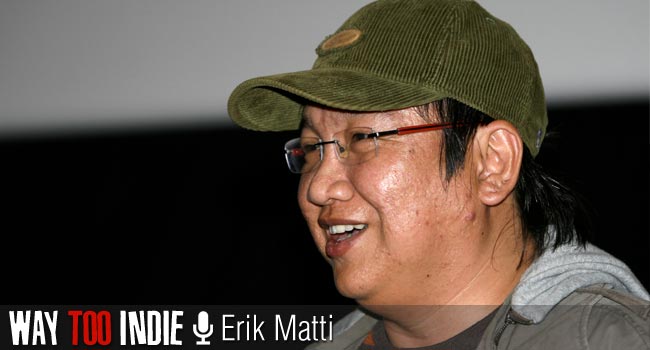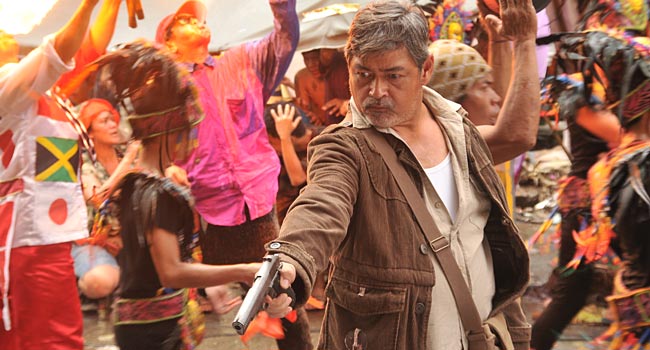Interview: Erik Matti of On the Job

Filipino director Erik Matti’s new crime thriller On the Job (my review) is based on a real-life Filipino scandal in which government officials used prisoners as hitmen, convincing prison wardens to release them for a day to carry out political assassinations. The film, set in the scuzzy streets of Manila, looks at the corrupt setup from four perspectives: Two of the inmate-hitmen, played by Joel Torre and Gerald Anderson, and two police officers, played by Piolo Pascual and Joey Marquez. The two duos swirl around Manila until their paths eventually collide in an explosion of violence and epic foot chases.
Matti chatted with us about introducing Americans to the beauty of Manila, where the high-concept idea came from, casting actors against-type, why people thought the film would only work if it was shot in Hong Kong, and more.
How did the idea for the film come to you, and how long had you been working on the script before entering production?
I came up with the concept around 11 years ago. I was working with a service driver on a shoot, and he was talking about how he just came out of prison, he was working as a hitman to earn money from the inside. It struck me as an interesting story. At that point, I didn’t know anything about the system that was happening inside the prison. I kept the story for a number of years. Around four years ago, I started thinking about it again, went into more research, and found a lot more stuff. Aside from the prison system, we eventually found out that it’s attached to a much bigger story, that it was financed by military people. It would be really difficult to bring prisoners out of prison without the warden’s approval, and the warden was a military appointee. That’s where the circle of conspiracy an corruption starts off. I did an 8-minute trailer with non-actors and eventually with Joel Torre, who made it into the final film as the lead actor. We sent it around for foreign financing, but at that point, everyone was thinking that they really loved the script, but the whole idea is kind of new for a Filipino movie. It feels very much like a Hong Kong movie. They said that if it was this kind of movie, but set in Hong Kong and with Chinese actors, we could easily finance it, but as a Filipino movie, there was nothing coming out anything like this, so we didn’t get any funding internationally. Eventually, we found our own financing through our company, Reality Entertainment. Then, we partnered with a big studio which allowed us to use some big-name actors. Aside from the international potential [of the film], we wanted a local appeal to it. Bringing in those big actors kind of helped.
After jumping through all those hoops, how gratifying is it that the movie is receiving so much buzz?
For the longest time, we didn’t have a film like this come out in the Philippines. It was a big gamble on our part as a production company, but it paid off. None of us thought that a movie like this would end up in the Director’s Fortnight at Cannes. What’s really gratifying was the overwhelming response of the audience when we theatrically released in the Philippines. We were able to tap an audience that rarely goes to the theaters, and they responded quite well. We’ve gotten really good reviews. Some films have some hating it, some loving it, but this one has had a kind of unanimous reaction. The [critics] all felt that it was an engaging film and they responded well. I realized that getting the local market to react to your film is more gratifying, really. You’ve hit a chord with your audience. With a project like this, something that hasn’t been seen in the Philippines for a while, it’s refreshing that an audience liked it. It’s overwhelming. We’re happy about it.
Talk about taking all the research you compiled an constructing a crime drama around it.
There were a few considerations. The first two drafts we made, where we didn’t really go crazy with our military consultant yet and just had the stories of the prisoner, just followed the story of Tatang. I personally didn’t want the entire movie set in prison (laughs). It’s kinda depressing. There was one aspect of the research that we chose to focus on, which was the idea that the reason why these politicians use prisoners as hitmen is because when the police start looking for the killers, they won’t be able to find them! That’s where the idea for the parallel story with the cops came in. That opened up the story to a broader milieu of the environment of the film. We didn’t just set it in the prison–we set it in the world of politics, the world of law and order–and it made it a little more ambitious and brought a bigger scope to it, but at the same time I was happy because I didn’t have to shoot everything in the prison! (laughs) We finished such a lengthy script, and in the DVD there are around 25 scenes that we took out, just so we had a more cohesive story. On script, you think it’s all needed, but when you start putting it together and you want a kind of energy and pace and dynamism to the film, you realize that there are things that really bog the pacing down. Structurally, the script is just like the film. There are no major repositioning of scenes. We removed some scenes that slowed down the material, but it’s mainly the same script. We’re quite happy. I’ve done a few films that have had major scene readjustments, like moving the second scene to the ending of the film, just to cure some narrative issues. This film[‘s adjustments] were just about pace, basically.

I want to get to the cast. They play coldhearted killers, but the film’s conclusion is completely heartbreaking, and I think that can be attributed to their great performances.
At the outset, when we were thinking of casting, we knew that this wouldn’t be a Jason Statham action movie. That’s why we didn’t want to get caught in the trap of casting an action star, which we could’ve easily done. We decided from the very beginning to cast very capable actors who have a very strong “everyman” feel to them. That’s the strength of Joel as an actor. If you look at him, he could blend in with the crowd, but he has a strong presence that’ll really get to you without making him generic. Piolo was the first one I sent the script to when I finished it. I’ve worked with him when he was starting out, teaching acting for three years, but we’d never worked on a film together. I figured he’d be perfect for Francis. When I gave him the script, I didn’t tell him who I wanted him to portray, and he picked Francis. A lot of people found him too dashing, or too handsome, but…it’s a movie! (laughs) Gerald is an up-and-coming star. I hadn’t seen much of his range prior to this film because he was mainly doing romantic comedies, almost like a matinee idol. In the film, it’s like his rite of passage to becoming an assassin. Also, as an actor, it is sort of his coming-of-age film, his entrance to doing much more adult, mature roles. There are character actors and there are superstars, and Gerald exudes star quality in a masculine, reckless kind of way, and that worked perfectly for his character. I did a film with Joey Marquez last year. He’s a big comedian in the Philippines. When we offered him this role, he said, “Do you really think I can do this?”, because it’s more dramatic, but we told him he could do it. A lot of people would play this role as an asshole or jerk. With him, there’s a charm with it, because his eyes have a lot of heart. He’s one of the most underrated actors in the Philippines.
In America, this will be a lot of people’s introduction into Filipino cinema. Are you excited by that?
We’re overwhelmed by it. Me and my partner, Dondon Monteverde, decided to go to the U.S. to see the premiere of the film, because it’s not every day that a Filipino film gets to be distributed in America by an American distributor. Some of our films are shown there, but mainly to the Filipino market and organized by Filipino distributers. We’re hoping that this crosses over to American audiences. We want them to see what kind of films we do, and hopefully they’ll look forward to other films we make.
This will also be a lot of Americans’ first look at Manila. Talk about your portrayal of the city–it’s pretty dark and gritty.
At the outset, the script was really designed as a noir film. A lot of the influence for the film is ’70s noir cinema, the films of Melville, and even the conspiracy films of the time before the cold war. The Paralax View, Marathon Man, all that stuff. I’ve done previous films that I wanted to be a tribute to Manila, but this is coming from something personal. A lot of our films go around the festivals abroad, and they usually showcase just one side of Manila, which is the poverty, 3rd world side. I wanted to pay tribute in general, not just showcasing the dirty side of it. I wanted to give a more objective view of the city, which is cinematically beautiful in a dirty kind of way. There’s the grimy street side of it, the Spanish colonial influence in the office buildings, there’s the expanses where people are fewer than the space, and also there’s the prison set where people are more than the space they’re allowed. I think those contrasts play well together.
